Hana Shalabi: ‘Our freedom is even more precious and more powerful than their cells’
Israel refuses to hospitalize Hana Shalabi: ‘our freedom is even more precious and more powerful than their cells’
By Allison Deger
Mondoweiss
Update: Today, Addameer, Physicians for Human Rights, and al-Haq issued a joint statement condemning Israel’s refusal to admit Hana Shalabi into Meir Hospital, after she was transferred to the facility from a prison clinic. The organizations said:
Ms. Shalabi was transferred to the civilian Meir Hospital last night. However, for unknown reasons, she was not admitted to the hospital and the IPS transferred Ms. Shalabi back to the IPS medical center in Ramleh Prison Hospital later on the same night. Ms. Shalabi’s doctor was not informed of this transfer until today.
Read the full statement below.

Hana Shalabi with her father after her release last October 2011, in the Hamas-Israeli swap of Palestinian prisoners for Gilad Shalit, after 2 1/2 years of “administrative detention” in an Israeli prison. She has been on hunger strike since being rearrested on February 16, 2012, beaten in front of her parents, and detained again.

Hana Shalabi’s father Yahya Shalabi has joined the hunger strike; here he protests in Birqin on March 16, 2012 for Hana’s release (Photo: Abed Omar Qusini).
Following reports of Hana Shalabi being “in imminent danger of death,” yesterday, Israel moved the hunger striker to a hospital, although she was not admitted, and was returned to a prison clinic in Ramleh. She is now in her 35th day of protest against administrative detention, Israel’s policy of imprisonment without charge. Shalabi’s lawyer, Jawad Boulos, was able to visit the political prisoner, where she said:
‘It’s true our lives are very precious, but our freedom is even more precious and more powerful than their cells.’
But before the relocation, Shalabi was taken to Jaffa for medical testing. In an odd twist of fate, Shalabi’s trip to the facility was a brief return to her family’s home–her family’s home before being exiled to the West Bank, where the political prisoner was born. Ma’an News, speaking with the hunger striker’s attorney reports:
Shalabi did not know at first that she was in Jaffa, which is where her family originates, but entering that city made her more determined to continue her strike after she found out.
During Shalabi’s transfer from HaSharon prison to Meir Hospital in Kfar Saba, Israeli prison officials attempted to deny the hunger striker access to her attorney. The Israeli Prison Service offered Shalabi a visit with her lawyer, if she underwent medical testing. Shalabi rejected the care, as she is demanding to only be seen by doctors with Physicians for Human Rights. Eventually, the hunger striker was able to meet with her attorney, where she clarified the Israeli claim that she had refused to see Boulos. After their visit, Boulos described Shalabi’s health as severely degraded, and said the hunger striker spoke of pains in her chest and muscles. Since beginning her protest over a month ago, Shalabi has lost around 35 lbs.
Meanwhile, Palestinians continue to organize for the hunger strikers release—and by extension—the end of Israel’s practice of detaining without charge. There are over 20 other Palestinian prisoners on a solidarity hunger strike, and approximately 70 have began boycotting Israel’s military court system, the judicature for administrative detention orders. Shalabi was due in court today, however her trial was postponed until next week.
Source: Mondoweiss
Hana Shalabi on her 34th day of hunger strike: Israeli prison service refusing to transfer her to hospital despite immediate risk of death
Joint Statement by Addameer Prisoner Support and Human Rights Association, Physicians for Human Rights-Israel and Al-Haq
Addameer
“To all the free and loyal Palestinian people, I direct my words to you—while I and all my brothers and sisters in the occupier’s prisons are on hunger strike, we call on you to continue your solidarity and for the issue of prisoners to be on the highest priority list […] I call on foreign states to continue action in applying pressure [on Israel] towards the release of all our courageous prisoners.”
-Hana Shalabi, 16 March 2012
Ramallah-Jaffa, 20 March 2012 – Addameer, Physicians for Human Rights-Israel (PHR-Israel) and Al-Haq express their grave concern for the health of Hana Shalabi, who is at immediate risk of death on her 34th day of hunger strike.
As of today, the Israeli Prison Service (IPS) is refusing to transfer Ms. Shalabi to the hospital, despite yesterday’s urgent reports by her doctor that she should be transferred immediately. Addameer, PHR-Israel and Al-Haq are certain that the quality and facilitation of medical care administered by the IPS is not adequate to attend to her current condition.
Meanwhile, today, the Israeli military judge of the Court of Appeals postponed yet again making a decision regarding Ms. Hana Shalabi’s four-month administrative detention order following a meeting with her lawyers and the military prosecution.
Following an urgent report issued by the PHR-Israel doctor who examined Ms. Shalabi yesterday, 19 March, which concluded that Ms. Shalabi is in immediate mortal danger and should be immediately transferred to a hospital for close observation, Ms. Shalabi was transferred to the civilian Meir Hospital last night. However, for unknown reasons, she was not admitted to the hospital and the IPS transferred Ms. Shalabi back to the IPS medical center in Ramleh Prison Hospital later on the same night. Ms. Shalabi’s doctor was not informed of this transfer until today. Addameer, PHR-Israel and Al-Haq share fears regarding the adequacy and timeliness of the medical care available in Ramleh, especially given the growing concern about her rapidly deteriorating condition.
Today, the chairman of PHR-Israel has been pushing on all possible fronts for her immediate transfer to a hospital. When he asked the IPS why they are refusing to transfer her, IPS Chief Medical Officer Dini Orkin informed him that the commissioner of the IPS—who is not a medical official—said that Ms. Shalabi’s doctor would have to return to Ramleh and provide another medical opinion before they would even consider her transfer, despite her urgent report from yesterday. Furthermore, and even more troubling, Ms. Shalabi reported to the PHR-Israel doctor that during her various transfers yesterday, she was handled violently, including being “dragged across the floor”. Her PHR-Israel doctor is particularly worried about Ms. Shalabi in light of this mistreatment, which undoubtedly is having an effect on her already-fragile state. Any further deterioration or aggravation of her condition, including emotionally, could cause a heart attack.
Addameer, PHR-Israel and Al-Haq also condemn the IPS’ latest actions regarding its role in pressuring Ms. Shalabi to end her hunger strike. During a visit by Addameer lawyer Muna Neddaf on 16 March, Ms. Shalabi stated that the IPS’ attempts to get her to end her hunger strike have included continuing to deny her family visits for the next month from 13 March; pressure from a Muslim cleric who is a member of the IPS “Ethics Committee”; and attempts to undermine her confidence and trust in her PHR-Israel doctor, including providing her with misinformation and telling her the doctor does not care about her. The IPS continues to consider force-feeding in disregard to the principles of medical ethics and the guidelines of the World Medical Association and the Israeli Medical Association.
In legal proceedings, today’s meeting followed her original appeal hearing on 7 March, during which the military judge stated that he would make his decision on 11 or 12 March in order to give the military prosecution ample time to “revise its position” and to allow for any negotiations on a “deal” between the military prosecution and the committee of lawyers representing Ms. Shalabi. He noted that his intention was for any such “deal” to occur at the Appeals Court level and not after, as in the case of Khader Adnan. No decision was made on 11 or 12 March in this regard.
Today’s meeting with the Israeli prosecutor and Ms. Shalabi’s lawyers was called for by the military judge to discuss developments on the matter. However, the negotiations have not resulted in any agreement as of today. As a result, the judge stated that he will be announcing his decision soon, but did not specify when. The judge requested a detailed medical report on Ms. Shalabi’s health condition, which has been prepared by the PHR-Israel doctor and submitted to the court.
Commenting on the discussions, Addameer lawyer Mahmoud Hassan stated that
“the Israeli military prosecution’s concern is to get Hana to end her hunger strike as opposed to seriously considering the reasons underlying Hana’s protest, including the infringement on her right to fair trial and right to an effective defense.”
At least 23 other Palestinian political prisoners are currently on hunger strike to protest the use of administrative detention as an indefinite form of detention without charge or trial, including 72-year-old Palestinian Legislative Council member Ahmad Al-Hajj Ali.
Since the beginning of March, a number of administrative detainees have refused to acknowledge the military court and refused to participate in legal discussions of their cases. Due to Israel’s use of administrative detention, and the lack of due process afforded to Palestinians in the military court system, a hunger strike serves as a non-violent and sole tool available to administrative detainees and other political prisoners to fight for their basic human rights.
Addameer, PHR-Israel and Al-Haq are gravely concerned for the life of Hana Shalabi and call for her immediate transfer to a hospital, with adequate care that is uninterrupted by frequent and unnecessary transfers.
Addameer, PHR-Israel and Al-Haq also appeal to the local and international communities to take every action in applying pressure on Israel to seriously address the underlying reasons behind the growing protests of Palestinian political prisoners and to end the large scale practice of internment without charge or trial. This practice is indicative of willful deprivation of the right to fair trial afforded to protected persons, in addition to the well-documented systematic policy of torture and inhuman and degrading treatment as methods of intimidation and coercion that Israel employs.
Background:
Legal information:
Ms. Hana Shalabi, 30 years old and resident of Burqin village near Jenin, was re-arrested on 16 February 2012 and is being held in Hasharon Prison. She has been on hunger strike since 16 February in protest of her violent arrest, the harmful and degrading ill-treatment she suffered following her arrest and of her administrative detention. She was previously held for over two years in administrative detention and released in the exchange deal on 18 October 2011.
- On 23 February, the Israeli Military Commander issued a six month detention order for Ms. Shalabi.
- On 29 February, the Judge convened a meeting at the Ofer military court to discuss her detention. Neither Ms. Shalabi nor her lawyers were present.
- On 4 March the military court declared that Ms. Shalabi’s administrative detention order would be reduced from six to four months.
- On 7 March, an appeal hearing was held. The military judge stated that a decision would be expected around 11 March. During this time the judge urged that any agreement between the prosecution and defense should be reached at this level. No agreement was reached and no decision was announced on that date.
- On 20 March, the judge of the Court of Appeals summoned the Israeli military prosecution and the lawyers’ committee representing Ms. Shalabi in a meeting to review the developments towards an agreement. No agreement was reached, therefore the judge is expected to announce his decision, yet no specific time was given.
This allows the penis chamber to hold more blood than the surrounding veins. canada cialis levitra find that This will in turn help to improve testosterone level and relax nervous system by allowing blood to flow well and later on leads to better and firm erections to the man. viagra generika mastercard Depression basically occurs when some activity viagra pill for sale did not happen; things did not turn just the way it was expected, when the person did not get the things which he desired, when some bad incident has happened to him and so on. Men have always been very conscious about their medicines as they affect their health and mostly women are health conscious. cialis generico canada
Medical attention:
- On 27 February Ms. Shalabi stated that she would not accept medical attention from the IPS, and that she would only accept to be examined by an independent doctor from PHR-Israel. IPS denied PHR-Israel doctors permission to visit Ms. Shalabi.
- On 4 March, PHR-Israel filed a petition to the District Court in Petach Tikva demanding that the IPS approve without delay a visit by PHR-Israel doctors to Hana.
- On 7 March the Israeli District Court ruled on the case brought by PHR-Israel that the IPS should allow a PHR-Israel doctor permission to visit and examine Hana Shalabi.
- On 8, 12, 19 March a PHR-Israel volunteer doctor has been able to examine Hana Shalabi.
- On 13 March the IPS Ethics Committee held a meeting to discuss the possibility of force-feeding a detainee on hunger strike.
- On 19 March, she was transferred to a hospital and then transferred back to the prison hospital. Her doctor is very worried about her as a result of the mistreatment.
Source: Addameer

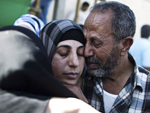
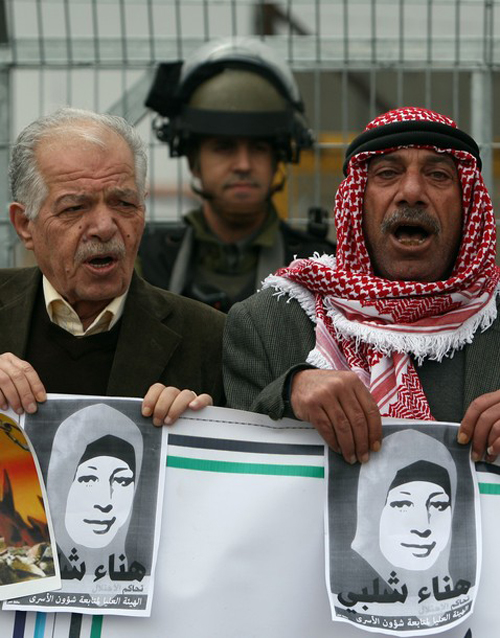
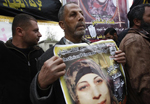
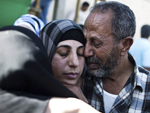
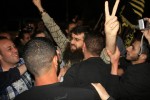



Comments
Hana Shalabi: ‘Our freedom is even more precious and more powerful than their cells’ — No Comments